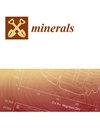Comparative Analysis of the Recovery of Cu2+ and Au from Washing Solution of Pyrite Concentrate Slag by Two Processes
IF 2.2
4区 地球科学
Q2 GEOCHEMISTRY & GEOPHYSICS
引用次数: 0
Abstract
A large amount of pyrite concentrate slag washing solution is produced in China every year, and this contains valuable components such as Cu2+ and Au. The traditional treatment method not only pollutes the environment but also wastes metal resources. For the washing solution containing Cu2+ 437 mg/L and Au 0.13 mg/L, two new processes comprehensive recovery schemes were developed and compared in this paper, namely iron powder replacement pore filtration and neutralization precipitation pore filtration. When the iron powder replacement pore filtration process was adopted, Cu2+ and Au were mainly comprehensively recovered in the form of a mixture of sponge copper and particulate gold. The test results showed that the replacement optimal conditions involved a pH of 3.0, iron powder dosage of 6 g/L, and replacement time of 3.0 h. After replacement, the filter cloth with below 1 μm pore size was used for filtration. The recovery rate of Cu2+ in the washing solution was 98.13 and the total recovery rate of Au was 95.83%. Otherwise, when the neutralization precipitation pore filtration process was adopted, Cu2+ and Au were mainly comprehensively recovered in the form of a mixture of copper hydroxide and particulate gold. The test results showed that sodium hydroxide was used as the precipitant and the optimum neutralization pH value was 6.5. After precipitation, the filter cloth with a below 1 μm pore size was used for filtration. The recovery rate of Cu2+ in the washing solution was 97.35% and the total recovery rate of Au was 93.54%. The economic benefit estimation of the two processes showed that the neutralization precipitation pore filtration process had the advantages of low material consumption, low cost and high economic benefit.通过两种工艺从黄铁矿精矿渣洗涤液中回收 Cu2+ 和 Au 的对比分析
中国每年都会产生大量的黄铁矿精矿洗渣液,其中含有 Cu2+ 和 Au 等有价值的成分。传统的处理方法不仅污染环境,而且浪费金属资源。针对 Cu2+ 含量为 437 mg/L、Au 含量为 0.13 mg/L 的洗涤液,本文开发了两种新工艺综合回收方案并进行了比较,即铁粉置换孔隙过滤和中和沉淀孔隙过滤。采用铁粉置换孔隙过滤工艺时,Cu2+和Au主要以海绵铜和颗粒金的混合物形式被综合回收。试验结果表明,最佳置换条件为 pH 值为 3.0,铁粉用量为 6 g/L,置换时间为 3.0 h。洗涤液中 Cu2+ 的回收率为 98.13%,Au 的总回收率为 95.83%。否则,采用中和沉淀孔过滤工艺时,Cu2+ 和 Au 主要以氢氧化铜和颗粒金的混合物形式被全面回收。试验结果表明,采用氢氧化钠作为沉淀剂,最佳中和 pH 值为 6.5。沉淀后,使用孔径低于 1 μm 的滤布进行过滤。洗涤液中 Cu2+ 的回收率为 97.35%,Au 的总回收率为 93.54%。两种工艺的经济效益估算结果表明,中和沉淀孔过滤工艺具有物料消耗少、成本低、经济效益高的优点。
本文章由计算机程序翻译,如有差异,请以英文原文为准。
求助全文
约1分钟内获得全文
求助全文
来源期刊

Minerals
MINERALOGY-MINING & MINERAL PROCESSING
CiteScore
4.10
自引率
20.00%
发文量
1351
审稿时长
19.04 days
期刊介绍:
Minerals (ISSN 2075-163X) is an international open access journal that covers the broad field of mineralogy, economic mineral resources, mineral exploration, innovative mining techniques and advances in mineral processing. It publishes reviews, regular research papers and short notes. Our aim is to encourage scientists to publish their experimental and theoretical results in as much detail as possible. There is no restriction on the length of the papers. The full experimental details must be provided so that the results can be reproduced.
 求助内容:
求助内容: 应助结果提醒方式:
应助结果提醒方式:


